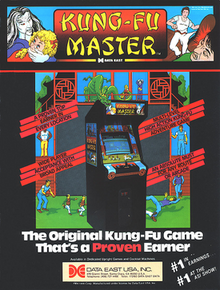| Kung-Fu Master | |
|---|---|
 North American arcade flyer | |
| Developer(s) | Irem Nintendo R&D4 (NES) |
| Publisher(s) | |
| Director(s) |
|
| Producer(s) | Scott Tsumura |
| Designer(s) | |
| Composer(s) |
|
| Platform(s) | |
| Release | November 24, 1984
|
| Genre(s) | Beat 'em up |
| Mode(s) | Single-player, multiplayer |
Kung-Fu Master, known as Spartan X[a] in Japan, is a 1984 beat 'em up game developed and published by Irem for arcades. It was distributed by Data East in North America. Designed by Takashi Nishiyama, the game was based on Hong Kong martial arts films. It is a loose adaptation of the Jackie Chan, Sammo Hung and Yuen Biao film Wheels on Meals (1984), called Spartan X in Japan, with the protagonist Thomas named after Jackie Chan's character in the film. The game is also heavily inspired by the Bruce Lee film Game of Death (1972), which was the basis for the game's concept. Nishiyama, who had previously designed the side-scrolling shooter Moon Patrol (1982), combined fighting elements with a shoot 'em up gameplay rhythm. Irem and Data East exported the game to the West without the Spartan X license.
The player controls Thomas, a kung fu master, as he fights his way through the five levels of the Devil's Temple to rescue his girlfriend Sylvia from the crime boss Mr. X. As he ascends the tower, he has to fight many enemies along the way and five end-of-level boss battles, a concept inspired by Game of Death. Thomas and each boss have a health meter, and the game temporarily becomes a one-on-one fighting game during boss battles.
The game was a major commercial success, topping the Japanese arcade charts and becoming America's second highest-grossing arcade game of 1985, while receiving critical acclaim for its fast-paced, side-scrolling gameplay and detailed, colorful graphics. A port for the Nintendo Entertainment System (known as the Famicom in Japan) was developed by Nintendo under the direction of Shigeru Miyamoto, released as Spartan X in Japan and Kung Fu in the West, selling 3.5 million copies worldwide. It was also one of the top five best-selling Commodore 64 games of 1986. It spawned the sequel Spartan X 2 (1991) and the spiritual successors Trojan (1986) and Vigilante (1988).
Kung-Fu Master was a highly influential game. It is regarded as the first beat 'em up video game, and an early example of the side-scrolling character action game genre, which became popular during the mid-to-late 1980s. Miyamoto's work on the NES port inspired his development of the side-scrolling platform game Super Mario Bros. (1985), while Nishiyama was hired by Capcom where he used the game's boss battles as the basis for the fighting game Street Fighter (1987), before working for SNK on fighting games such as Fatal Fury and The King of Fighters. Kung-Fu Master also influenced other media, such as the Red Ribbon Army saga (1985–1986) of the manga and anime series Dragon Ball, as well as the French film Kung Fu Master (1988).
- ^ Cite error: The named reference
flyerwas invoked but never defined (see the help page). - ^ Cite error: The named reference
Copyrightwas invoked but never defined (see the help page). - ^ a b Cite error: The named reference
CVGwas invoked but never defined (see the help page). - ^ "スパルタンX". Famitsu. Retrieved 17 March 2021.
- ^ Cite error: The named reference
CVG75was invoked but never defined (see the help page). - ^ a b "1985 Index" (PDF). Computer Entertainer. Vol. 4, no. 10. January 1986. p. 6.
- ^ "Kung Fu Master". Zzap!64. No. 11 (March 1986). United Kingdom: Newsfield. 9 February 1986. p. 31.
- ^ Cite error: The named reference
VCSwas invoked but never defined (see the help page). - ^ a b Cite error: The named reference
man7800was invoked but never defined (see the help page). - ^ a b Cite error: The named reference
CGW27was invoked but never defined (see the help page). - ^ Cite error: The named reference
PCWwas invoked but never defined (see the help page). - ^ a b Cite error: The named reference
Micomwas invoked but never defined (see the help page). - ^ a b Cite error: The named reference
Ishizakiwas invoked but never defined (see the help page). - ^ Cite error: The named reference
Iwatawas invoked but never defined (see the help page).
Cite error: There are <ref group=lower-alpha> tags or {{efn}} templates on this page, but the references will not show without a {{reflist|group=lower-alpha}} template or {{notelist}} template (see the help page).